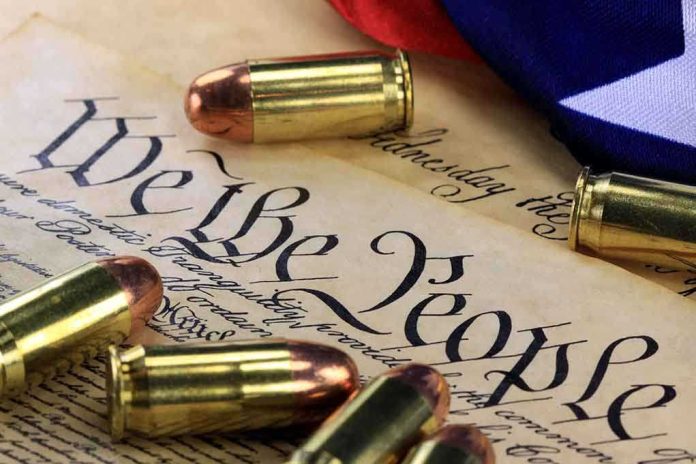
Wythe County’s sheriff has eliminated concealed carry permit fees, striking a major blow against what many see as unconstitutional barriers to the Second Amendment and igniting fresh debate over local autonomy in gun rights.
Story Snapshot
- Wythe County Sheriff Anthony R. Cline stopped collecting the $35 concealed carry permit fee, calling it an infringement on constitutional rights.
- The move is a direct response to ongoing debates over gun regulation and government overreach, emphasizing local action over state mandates.
- This policy shift may encourage other counties to follow suit and challenges the legitimacy of permit fees as obstacles to lawful gun ownership.
- Gun rights advocates applaud the decision, while critics warn of potential administrative and safety concerns.
Sheriff Cline Ends Permit Fees, Defending Constitutional Rights
On August 5, 2025, Wythe County Sheriff Anthony R. Cline publicly announced his office would no longer collect the $35 fee for concealed carry permit applications. Cline asserted that citizens should not pay to exercise their constitutional rights, underscoring his commitment to the Second Amendment. This decision was not the result of new legislation or a statewide reform, but a unilateral move by a county sheriff determined to remove what he called an “unconstitutional barrier” to lawful gun ownership.
Wythe County, situated in rural southwestern Virginia, has a strong tradition of supporting gun rights. Virginia law allows localities to charge up to $35 for processing concealed carry applications, intended to cover administrative expenses and background checks. However, Sheriff Cline’s action is part of a growing movement among local officials to push back against what many see as government overreach and excessive regulation. By framing the fee as an infringement on the Second Amendment, Cline’s decision resonates with residents who have long opposed state and federal encroachments on individual liberties.
Local Autonomy Versus State Policy: A New Flashpoint
This policy shift highlights the tension between local autonomy and statewide regulatory consistency. While the sheriff has significant authority within the county, he operates under the broader framework of Virginia law. The decision may spark friction with state officials who seek uniformity in the implementation of gun policies. In recent years, numerous Virginia counties have adopted “Second Amendment sanctuary” resolutions in response to state-level gun control initiatives, signaling a broader trend of local resistance to mandates perceived as hostile to constitutional rights.
Wythe County’s move is not without precedent; other counties across the nation have reduced or eliminated concealed carry fees, often on constitutional grounds. Still, such actions remain the exception rather than the rule and can create uncertainty for residents, law enforcement, and policymakers alike. The lack of immediate state intervention or legal challenge suggests either tacit approval or an unwillingness to escalate local disputes into broader confrontations—at least for now.
Immediate and Long-Term Impacts on Gun Rights and Local Governance
In the short term, Wythe County residents seeking concealed carry permits now save $35 per application, potentially leading to more permit requests and greater participation in lawful gun ownership. For the sheriff’s office, the loss of fee revenue may strain resources needed for background checks and administrative processing. The long-term implications could be more profound: if other counties follow suit, the precedent may weaken the legitimacy of permit fees statewide and pressure lawmakers to reconsider their necessity. This development also positions Sheriff Cline and Wythe County as leaders in the ongoing fight against regulatory overreach, reinforcing the role of local officials as defenders of constitutional rights.
Gun rights advocacy groups have praised the decision as a principled stand for liberty, while gun control advocates warn that eliminating fees could undermine oversight and public safety. Legal scholars acknowledge that while modest administrative fees are generally permissible, excessive or punitive charges may be unconstitutional. Critics argue that removing the fee is largely symbolic, given its relatively small size, but supporters counter that any financial barrier to a constitutional right is unacceptable. The coming months will reveal whether this local policy inspires broader action across Virginia and the nation—or triggers new legal and political battles over the boundaries of gun regulation and local autonomy.
Sources:
Virginia Sheriff Ends Fee Collection for Concealed Carry Permits – American Faith
Court of Appeals of Virginia – Unpublished Opinions, Case 0620-24-3
Virginia Politics – Ground News







